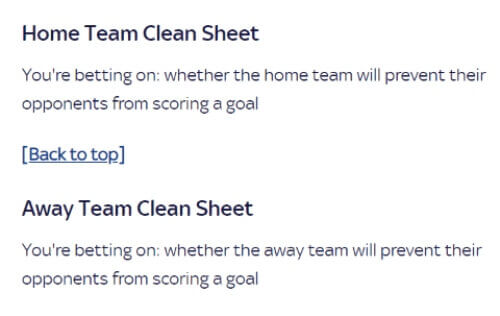It’s one of the most commonly used phrases in football. ‘Clean sheet’ is accepted across the board as a term to describe one or both teams’ success in not conceding a goal during the entire game. Few people know the reason behind its naming, and even fewer realise that they actually care. Here, we reveal everything.
What Does ‘Clean Sheet’ Mean in everyday life?
In everyday terms, the term ‘Clean Sheet’ may literally refer to bed covers that are clear of marks or stains. This obviously has nothing to do with football and could not be further from its use in the sport.
‘Clean Sheet’ is also used as a means of describing a fresh start. For instance, if two friends go through a rough patch and want to start all over again, one could ask the other if they could ‘start with a clean sheet of paper’ or a ‘clean slate’. Again, this is irrelevant to football.
You may have asked your teacher for a ‘clean sheet’ of paper at school. You could find yourself looking for clean sheets of A4 paper for your printer at work or at home. This is more in line with its original link to football – albeit quite loosely.
So where does the phrase ‘Clean Sheet’ come from and why is it so often used by football players, commentators, pundits and supporters?
Meaning Of ‘Clean Sheet’ in Football
Essentially, it refers to a goalkeeper not conceding a goal throughout the duration of a football match. If a match ends 1-0, the winning team will have kept a ‘clean sheet’. Should the game end 0-0, both teams have a clean sheet. Here’s a clear breakdown of football results and how to tell which team has kept a clean sheet.
- 0-0 – Both teams have a clean sheet.
- 1-0 – Winning team (the team with one goal) has a clean sheet as the opposition did not score.
- 1-1 – Neither team has a clean sheet as both teams scored.
Why Is It Called ‘Clean Sheet’?
Back in the olden days of football (primarily pre-internet), most statistics were written down on paper. Statisticians did not have free access to a plethora of information in the same way that we do today, hence the reason behind the OPTA declaration that some data before 2006 may be inaccurate or only partially incomplete. To see this alert, open an app like FotMob and examine the history of a team or player that played during the first few years after the turn of the century.
Like stats, most scores were written by hand. If a team failed to score, statisticians did not need to record that a goalkeeper conceded a goal. As a result, the space next to the goalkeeper’s name was left clean. In other words, the goalkeeper kept a ‘clean sheet’.
As football moved forward and technology became ever-more intertwined with the way those associated with the game digest data, the need to write statistics on paper dissipated. Yet, the term ‘Clean Sheet’ continued to be utilised in order to describe the fact that a goalkeeper did not concede a single goal.
We’ve seen similar to this done in the past. The world of football still calls it a ‘booking’ when the referee gives a player a yellow or red card despite physical books to record foul play being out of the sport for decades.
Football loves tradition, and ‘Clean Sheet’ is deeply rooted in the minds of lovers of the sport.
What Does ‘First Half Clean Sheet’ Mean?
‘First Half Clean Sheet’ describes one or both teams successfully preventing the opposition from scoring during the opening 45 minutes of a match.
Football has two halves separated by a 15-minute break. The ‘first half’ is 45 minutes long (00:00 to 45:00) and may have a short period of additional time. If this happens, the referee’s assistant will signal that ‘X’ number of minutes will be played before the half-time interval. Unless otherwise stated by the bookmaker, goals scored during additional time will count towards your ‘First Half Clean Sheet’ wager.
For example, let’s say Liverpool play against Manchester United and the Red Devils take a 0-1 lead into the break. In this instance, United will have kept a ‘First Half Clean Sheet’ Any bets on this outcome win.
What Does ‘Second Half Clean Sheet’ Mean?
‘Second Half Clean Sheet’ is more or less the same thing as ‘First Half Clean Sheet’. The only difference between the two is the period of time in which they take place.
Like the ‘first half’, the ‘second half’ is 45-minutes long (45:00 to 90:00). Whether or not additional time is played beyond the standard 90 minutes is at the referee’s discretion. If a team is successful in stopping the opposing outfit from scoring from kick-off after half-time until the conclusion of the event, they earn a ‘second half clean sheet’. Goals scored in the first half are not considered in the outcome of ‘second half clean sheet’ bets.
Here’s an example using the same Liverpool vs Manchester United game we discussed earlier.
- Manchester United win the first half 0-1.
- In the second half, Liverpool equalizes to make it 1-1.
- The match ends on level terms.
- As Liverpool did not concede in the second half, bets on ‘Liverpool Second Half Clean Sheet – Yes’ win.
- Any bet on Manchester United to keep a clean sheet in the second half does not payout as they conceded a goal between minutes 45:00 to 90:00 (including injury time).
Why Are The Odds Different To Under 0.5 Goals?
If the outcome for ‘Clean Sheet’ and ‘Under 0.5 Goals’ is the same, why aren’t the odds? If a match ends with ‘Under 0.5 Goals’, it is 0-0 and both teams keep a clean sheet. Therefore, bets on ‘Under 0.5 Goals’ and ‘X Team Clean Sheet – Yes’ pay out winnings.
However, bookmakers often upload unique odds for both markets. This is because the odds for ‘Under 0.5 Goals’ and ‘Clean Sheet’ are not calculated in the same way.
‘Under 0.5 Goals’ falls under the same umbrella as ‘Under 1.5 Goals’, ‘Under 2.5 Goals’ and so on. There are various options open to bettors. On the other hand, ‘Clean Sheet’ markets have just two options: yes or no. Moreover, you’re betting on one (1) team when you select the ‘Clean Sheet’ market. For ‘Under 0.5 Goals’, you’re generally betting on the match as a whole.
The more variables there are, the greater the difference in pricing.
Here’s a description of the ‘Home Clean Sheet’ and ‘Away Clean Sheet’ selections by SkyBet:
SkyBet
Home Team Clean Sheet – You’re betting on whether the home team will prevent their opponents from scoring a goal.
Away Team Clean Sheet – You’re betting on whether the away team will prevent their opponents from scoring a goal.

And here’s how William Hill defines ‘Under 0.5 Goals’ betting.
WIlliam Hill
Predict whether the number of goals scored in a match will be over/under the number specified.

The difference in wording is clear as day. As such, diversity in pricing should be expected.
Clean Sheet Betting Strategy & Tips
There’s just one thing you need to look for when betting on this market: a team’s ability to keep clean sheets.
If they have an excellent record in the ‘clean sheet’ department then they’re probably a good bet for upcoming games. This is especially true in fixtures where the team you’re betting on faces a weaker opponent. More pressing in this instance is finding a rewarding price for your selection.
Take Manchester City. They have world-class defenders, disciplined midfielders and hard-working attackers. The entire team protects the goalkeeper by winning the ball as soon as possible after losing possession. While this may look an easy choice on paper for ‘Clean Sheet’ wagers, you’ll be hard-pressed to find odds that are truly worth your while.
That’s why you should focus on mid-to-upper table sides (Premier League). The division is packed with top teams boasting excellent defensive units, making it easy to come across a winning selection nearly every week. Here are some important stats to add you can incorporate into your betting strategy (correct as of October 2022).
- By October 2022, Bournemouth, Brighton, Newcastle and Wolves were joint-second behind Manchester City on the ‘Clean Sheet’ standings in the Premier League (3).
- All three of Arsenal’s clean sheets were recorded away from home.
- Southampton were the last team in the Premier League to record a clean sheet.
- Bournemouth have recorded the most ‘Home’ clean sheets.
Statistics were gathered from the official Premier League website and footystats.org. We recommend both platforms if you plan on carrying out further analysis and investigation.
Other tips for backing a team to keep a clean sheet:
- Opposition injuries. If a team A are playing team B who are suffering from either suspensions or injured players, particularly those that normally score the goals, then team A will be more likely to keep a clean sheet.
On the other end of the scale, if team B has a fully fit squad of goalscorers, team A will be unlikely to keep a clean sheet. - Type of fixture. Some fixtures like International tournaments, cup matches, and stale mid-table league games can be pretty dry in terms of goals scored – thus increasing the odds of a team keeping a clean sheet. This can also happen in top-of-the-table clashes, too – where the stakes are high, and teams sit back and defend deeply.
Best Bookies For Clean Sheet Betting
There are loads of great bookmakers offering prices for ‘Clean Sheet’ selections. This is because sportsbooks are in a never-ending battle to accumulate the highest number of customers, forcing them into providing the best possible experience for novice punters and experienced players.
Below is a list of our favourite bookies offering the ‘Clean Sheet’ market.
- Bet365
- SkyBet
- William Hill
To find the ‘Clean Sheet’ market at a site like Bet365, navigate to the event you want to bet on. From here, select ‘Goals’ and scroll down. An option for ‘Clean Sheet’ should appear somewhere in the middle of your page.

Pick between ‘Home Team – Yes/No’ and ‘Away Team – Yes/No’. If your selection is correct, you’ll earn a profit on your wager.


